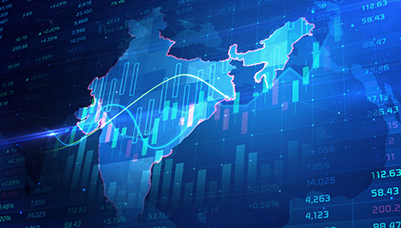An Interview with Mr. Bill Bonner from Agora
Posted On Sunday, Jan 01, 1950
1. What are the parameters that you consider in an economy?
As we see it, the world economy as a whole is generally very interdependent, and so to understand what is going on in one place you have to understand what is going on in other places. Of course you would have to get into each country in great detail before you really know anything significant. Our focus so far has been on only the broadest countries, but we also have analysts looking at specialised markets.
In the big picture what we’re looking at is the flow of funds and the position in development and credit expansion. Ideally we want a market where the credit is just beginning to expand and where there doesn’t seem to be anything stopping it.
Lately our focus is primarily based in America and on the US economy, and by necessity on the Chinese economy because those two seem to be working hand in hand.
It all also depends on circumstances, and we’re in an extraordinary time in history where the States are ruining themselves and that’s something we’re concerned about quite a bit. This is the first time that major countries like the United States is faced with a credit problem.
What it shows is that something new is happening, something big, and this is something that investors should definitely not ignore. The States are all approaching some form of bankruptcy, maybe inflation, maybe default, some crisis is coming in the public accounts nationally and we need to pay attention to that.
Meanwhile when we look at what is happening in each individual country, you get different stories from different places. China for instance seems to be dominated by credit expansion in the capital sector. It’s expanding its factories and infrastructure at a very fast rate. Over the last 18 months, there is a huge disparity in the credit rates, and bank lending rates in China, and that’s why we’re telling people not to invest in China, because we think it’s too risky there. What is happening in China reminds us about what happened to Japan in 1987 and finally in 1989, when there was a huge run-up in credit in the capital sector in Japan, which finally blew up in 1989.
What I see is the parallel to what is happening in China – an export-driven economy, primary customer is the US, pressure to raise its currency, over expansion, bubble in the property market – all those things haunt China now and its government is doing just the wrong thing. It’s in a position where its primary customer, the US is forced to downsize it’s spending. And what it should do is it should is downsize its production, but its doing just the opposite. So that’s got to go bad. In the meantime we’re advising our readers not to invest in China. They may come out of it in due time, but as of now it’s risky.
2. But the Chinese have a huge local populace. Do you think that internal consumption could help rebalance China?
Certainly! That’s what the communists all talk about: rebalancing the economy without depending on export – which I certainly think will happen, but that’s not something that happens overnight. That happens over a period of 5 – 10 years. It’s a long process. Right now all factories that are making goods for the foreign buyers need to be re-configured for the local buyers. This process will definitely take time. Also that is not being encouraged because China is largely an export-driven economy, and hence all they’ve got is export plans. They don’t have any internal plans as of now. Internal plans will come, but it will come later, and it will probably come after a big disaster.
3. Unemployment is on the rise – US, Europe, etc. Do you see labour unions coming back into form? Do you see countries becoming protectionist towards their own people, rather than outsourcing?
It’s a natural thing, especially in America, where if people are faced with lowered standards of living they are going to resent the export of jobs.
Nowadays labour is much harder to organise than how it used to be. Earlier you stood outside a factory, the guys came out, you gave them a leaflet and you talked to them. Now it’s dispersed, so it’s hard to see how labour can organise. But you’d expect the government to respond to the appeal of the population for protection.
We also know that the last great depression was a depression caused by protectionism, so it’s a very dangerous thing and I suspect there’ll be lots more talk about it, but whether there’d be anything going on is hard to know. It’s hard to know how the political process will respond. And if push comes to shove then you’ve got the falling apart of political unions.
4. Do you see Spain and Portugal following Greece? Or, do you see big brothers like Germany and France bailing them out?
No I don’t see them bailing them out, because they’re not going to want to. What they’re doing now is they’re trying to find some middle way out. They’re saying, “We’re not going to bail you out, but we’ll try to keep you from going broke, if you meet us halfway. Show us that you’re going to cut back spending.” They’re working on that right now.
But I don’t think the citizens of Germany are going to permit their government to write a cheque to Greece. I think there’s going to be some muddling there, see how far they’re willing to go. Ireland’s already gone a good way, by the way. Ireland has cut back a lot on its spending. The teachers and civil servants in Ireland actually earn less than they did a year ago. They actually cut salaries which is remarkable.
So we see there’s a good deal of give and take.
5. Where do you see markets going ahead in 2010? Do you see an upswing?
I will not presume to know where they will go, but I will presume to say that risk is on the downside. The risk is that if something goes wrong – somebody says something, something happens, Greece defaults, a higher unemployment number, a property price number, it could be anything – but the risk is on the downside.
6. So any particular economies you think might up the trends?
Well, I think India is probably the most likely to buck the trend. India is not dependent on exports; exports are 15% of GDP, while in China they’re about 50%, so no comparison there. So if world trade falls, India’s not going to be particularly hurt.
India has a huge consumer base, which is young and growing, doesn’t have much consumer credit, and a very decent savings rate.
As an economy develops, people become more laxed about spending. They begin to trust that there’ll be jobs, that their credit cards will work, that their mortgages will function, that prices will go up. Then they begin to be a little more free about spending money, and when that happens in a place like India, you can have a big boom over a long period of time.
So I think India is a good bet. I don’t think that this is particularly a good time to keep betting but of the choices, India is a pretty good option.
Yes, I do believe in the Indian growth story. I say that knowing that all stories go bad, so it’ll probably go bad sometime, but as a story, it’s the best one I’ve heard lately.
7. What are your views on Gold? Why would you say it will be “the last man standing”?
We’re at a period which I think is the resolution of a long crisis in the making. Because fundamentally since 1971 all the world’s currencies use the dollar as reserve, and what does the dollar use as a reserve, there isn’t anything. That system to me is inherently unstable and unsustainable. I don’t know exactly where we are in that cycle, but I’m pretty sure that at the end of it the dollar will not be worth as much as it is today. But somewhere along the line people are going to be very nervous and when they are very nervous they begin to suspect that everything is falling apart, so they will look towards gold.
From tracking gold prices from 1998 till date, you can tell that that’s not a bubble, it’s a solid bull story.
Another thing is that people get very greedy, and they get very afraid. Because when they’re greedy they will buy even if gold is going up.
What really sends prices up is when people begin to worry about the rupee, the dollar, the currency; they wonder what it’s really worth, they wonder what’s going wrong, and they turn towards gold. And when that happens I think you’ll see the price of gold up to $3000.
And when this monetary policy falls apart, I believe that gold will be the last man standing.
8. Smart tips on investing?
• You are either a contrarian or you’re a victim. Because if you follow a trend you’re always late to buy, etc.
• As they say, you make your money when you buy, which means that when you buy you either get something good or something bad. So you got to buy inexpensive because over time there is no arguing that that’s the typical nature of the stock market, if you buy at the top, its going to go down.
Related Posts
-

Looking Beyond the 10-Year Benchmark: Decoding India’s Bond Market Signals
Posted On Thursday, Feb 26, 2026
If you glance at India’s financial headlines today, the tone feels reassuring.
Read More -

From Storage to Circulation
Posted On Thursday, Feb 26, 2026
From Storage to Circulation: Can Total Return Swaps Transform India’s Corporate Bond Market?
Read More -

Gold Monthly for February 2026
Posted On Tuesday, Feb 03, 2026
Gold began the new year on a strong footing, carrying forward the momentum from the previous year and extending its upward rally.
Read More



